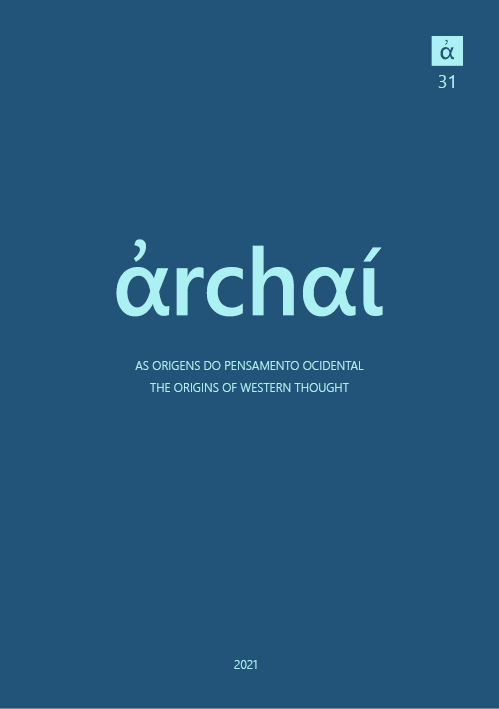Unity and Multiplicity in Plato's diairetic method in the Sophist
DOI:
https://doi.org/10.14195/1984-249X_31_30Keywords:
Plato, being, ontology, unity, dialectic, languageAbstract
By placing diairesis in communion with the dialectic, Plato breaks with the dichotomous-univocal Parmenidean structure; in Fragment 2 of the poem On Nature by Parmenides, the goddess establishes that there are only two routes to the truth, one that is and one that is not. Of these two, Parmenides denies the second, stating that it is impossible to know what is not: for the pre-socratic philosopher to know something is related to what is, therefore, for him, it is impossible to know what is not. So, in Parmenides, there is a split between “being” and “not-being”. Therefore, our objective in this article, is to explore the implications, for the diairesis in Plato's Sophist, of the Parmenidean affirmation that non-being is impossible to know.
Downloads
References
AUBENQUE, P.; NARCY, M. (1991). Études sur le Sophiste de Platon. Napoli, Bibliopolis.
BENARDETE, S. (1984) The being of the beautiful: Plato's Theaetetus, Sophist and Statesman. Chicago, University of Chicago Press.
CAVALCANTE FILHO, F. de A. V. (2013). Os problemas da opinião falsa e da predicação no diálogo sofista de Platão. Tese (Doutorado em Filosofia) - Universidade Federal da Paraíba, João Pessoa.
CHERNISS, H. (1933) L'enigme de I'ancienne Académie. Transl. L. Boulakia. Paris, Vrin.
CORDERO, N.-L. (1993) Platon, Le Sophiste. Paris, GF Flammarion.
CORDERO, N.-L. (2016) Platón contra Platón: la autocrítica del Parménides y la ontología del Sofista. Buenos Aires, Biblos.
CORNFORD, F. M. (1935). Plato’s theory of knowledge, the “Theetetus” and the “Sophist” of Plato. London: Kegan Paul, Trech, Trubner. New York: Harcourt, Brace.
CRIVELLI, P. (2012) Plato’s account of falsehood: a study of the Sophist. Cambridge, Cambridge University Press.
CURD, P. (1998). Eleatic Monism and Later Persocratic Thought. Princeton: Princeton University Press.
DIXSAUT, M. (1987) Platon et le logos de Parménide. In: AUBENQUE, P. (Dir) Etudes sur Parménide, II. Paris, Vrin, p.215-253.
DUKE, E. A.; HICKEN, W. F.; NICOLL, W. S. M.; ROBINSON, D. B. (eds.) Platonis Opera, Tomus I. Oxonii: E Typographeo Clarendoniano, 1995.
HARTE, V. (2015) Parte e todo em Platão: a metafísica da estrutura. Tradução de L. M. Fontes. São Paulo, Annablume Clássica.
IGLÉSIAS, M. (1997) A relação entre o Não Ser como Negativo e o Não Ser como Falso no Sofista de Platão. In: O que nos faz pensar, n. 11, p. 5-44.
KOSTMAN, J. P. (1973) False logos and not-being in Plato’s Sophist. In: MORAVCSIC, J. (Ed.). Patterns in Plato’s thought. Boston, D. Reidel Publishing, p. 192-212.
MARQUES, M. P. (2006) Platão, pensador da diferença-uma leitura do Sofista. Belo Horizonte, Editora UFMG.
McCABE, M. M. (1994) Plato’s Individuals. Princeton University Press, New Jersey.
MCDOWELL, J. (1982) Falsehood and Not-Being in Plato’s Sophist. In: SCHOFIELD, M.; NUSSBAUM, M. (Ed.). Language and logos: studies in ancient Greek Philosophy. Cambridge, Cambridge University Press, p. 115-124.
O'BRIEN D. (1995) Le non-être. Deux études sur le Sophiste de Platon. Sankt Augustin: Academia Verlag.
PALEIKAT, J.; COSTA, J.C. (trad.) (1972) Fédon, Sofista, Político In: CIVITA, V. Platão. Diálogos: São Paulo, Abril Cultural, p.61-269.
PAVIANI, Jayme. (1998) Identificação dos processos dialéticos em Platão. Veritas, v. 43, n. 4, p. 817-841.
PHILIP, A. (1966) Platonic diairesis. Transactions of the American Philosophical Society 97, p. 335-358.
SANTOS, B. H. de O. (2020) O primor dialético no Sofista: uma análise da diairesis. Em curso 7, n. 1, p. 47-61.
SANTOS, J. G. T. (2018) Metamorfoses do logos: do não-predicativo ao predicativo. Archai, n. 24, 2018, pp. 179-206.
SANTOS, J. T. (2000) Da natureza. Brasília, Thesaurus.
SAYRE, K. M. (1976) Sophist 263B Revisited, Mind LXXXV 340, p. 581–586.
SELIGMAN, P. (1974). Being and not-being: an introduction to Plato’s Sophist. The Hague: Martinus Nijhoff, Netherlands.
SILVA, A. L. B. (2012). Plato and the third bank of the river: a investigation on division and ontology of ideas in sophist. Dissertação (Mestrado em Ciências Humanas) - Universidade Federal de Uberlândia, Uberlândia.
SOUZA, E.C. (1997) Sobre a teoria da participação das formas no Sofista de Platão. Hypnos, n. 3, p.81-88.
SOUZA, E.C. (2009) Discurso e ontologia em Platão: um estudo sobre o Sofista. Ijuí, Editora Unijuí.
SOUZA, J.C. (trad.) (1972) O Banquete. In: CIVITA, V. Platão. Diálogos: São Paulo, Abril Cultural, p.7-60.
SOUZA, J.C. (trad.), SANTOS, J.T. (2016) Platão. Fedro, São Paulo: Editora 34.
VAZ, H. C. L. (1954). A Dialética das Ideias na Sofista. In: Revista Portuguesa de Filosofia. Braga, tomo X, p. 122-163.
VAZ, H. C. L. (2001) Escritos de filosofia VI-Ontologia e história. São Paulo, Loyola.
Downloads
Published
How to Cite
Issue
Section
License
Copyright (c) 2021 Bárbara Helena de Oliveira Santos

This work is licensed under a Creative Commons Attribution 4.0 International License.
Given the public access policy of the journal, the use of the published texts is free, with the obligation of recognizing the original authorship and the first publication in this journal. The authors of the published contributions are entirely and exclusively responsible for their contents.
1. The authors authorize the publication of the article in this journal.
2. The authors guarantee that the contribution is original, and take full responsibility for its content in case of impugnation by third parties.
3. The authors guarantee that the contribution is not under evaluation in another journal.
4. The authors keep the copyright and convey to the journal the right of first publication, the work being licensed under a Creative Commons Attribution License-BY.
5. The authors are allowed and stimulated to publicize and distribute their work on-line after the publication in the journal.
6. The authors of the approved works authorize the journal to distribute their content, after publication, for reproduction in content indexes, virtual libraries and similars.
7. The editors reserve the right to make adjustments to the text and to adequate the article to the editorial rules of the journal.



